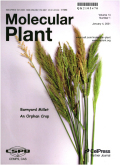摘要There are many challenges facing the development of high-yielding,nutritious crops for future environ-ments.One limiting factor is generation time,which prolongs research and plant breeding timelines.Recent advances in speed breeding protocols have dramatically reduced generation time for many short-day and long-day species by optimizing light and temperature conditions during plant growth.How-ever,winter crops with a vernalization requirement still require up to 6-10 weeks in low-temperature con-ditions before the transition to reproductive development.Here,we tested a suite of environmental condi-tions and protocols to investigate whether the vernalization process can be accelerated.We identified a vernalization method consisting of exposing seeds at the soil surface to an extended photoperiod of 22 h day:2 h night at 10℃with transfer to speed breeding conditions that dramatically reduces generation time in both winter wheat(Triticum aestivum)and winter barley(Hordeum vulgare).Implementation of the speed vernalization protocol followed by speed breeding allowed the completion of up to five generations per year for winter wheat or barley,whereas only two generations can be typically completed under stan-dard vernalization and plant growth conditions.The speed vernalization protocol developed in this study has great potential to accelerate biological research and breeding outcomes for winter crops.
更多相关知识
- 浏览5
- 被引0
- 下载0


相似文献
- 中文期刊
- 外文期刊
- 学位论文
- 会议论文



 换一批
换一批 换一批
换一批



